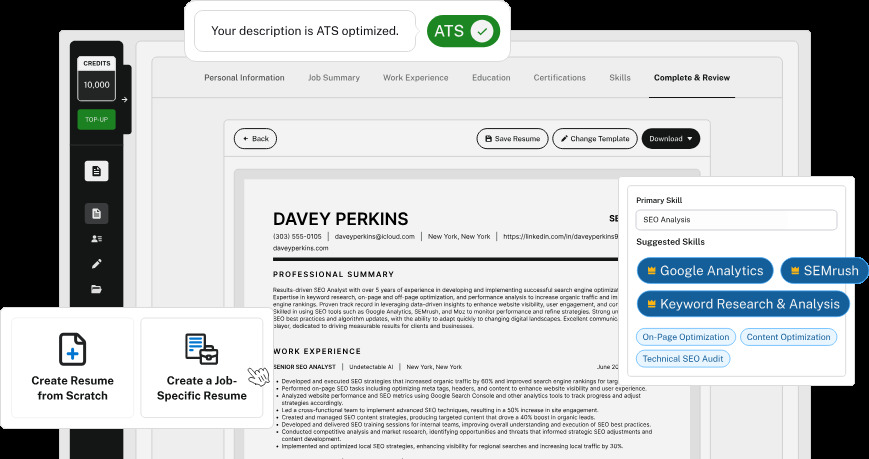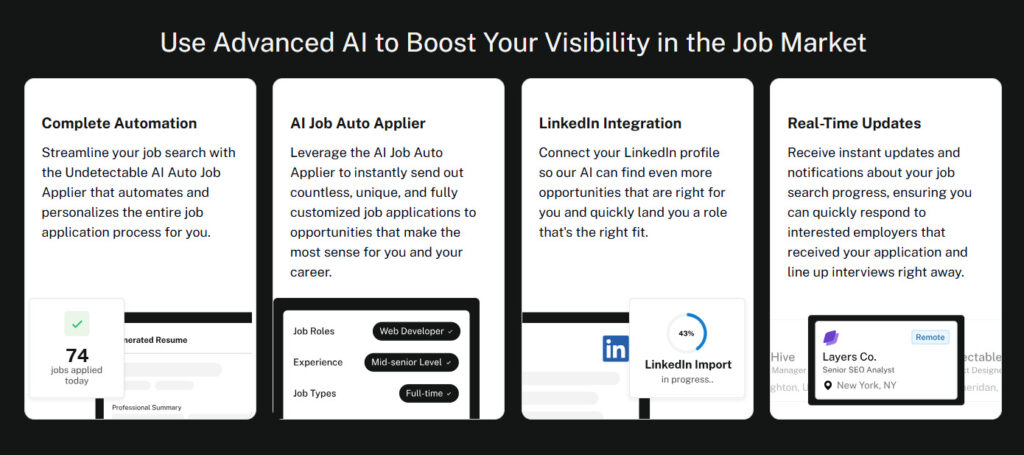When the future is uncertain, you create paths.
That’s how many successful professionals thrive.
They don’t lean on luck but rather build clearly defined objectives to guide them.
Career goals aren’t the same as job goals.
Sure, being promoted is a win, but career goals are about long-term fulfillment.
They involve looking beyond your next step and focusing on the entire growth journey.
You don’t want to be promoted to Team Leader and stay stagnant. You want to wonder, “What’s next?”
A game doesn’t end after you finish level 1. You have to defeat the boss, level up, and save the princess.
That’s what’s fun about setting your career goals.
By clearing all the checkpoints, you will be able to grow and learn new things, which will help you achieve your overall dreams.
Successful professionals like Sara Blakely, Satya Nadella, and Indra Nooyi have used goal-setting to transform not just their careers but entire industries.
Whether you want to climb the corporate ladder, pivot to a new field, or simply find more fulfillment in your work, here’s everything you need to define and achieve your career goals.
What Are Career Goals?
Career goals are the professional objectives you set to guide your work life.
They represent what you want to accomplish in your professional journey, both in the near future and over the long term.
These objectives serve as a roadmap, helping you make decisions about everything from skill development to job opportunities.


Never Worry About AI Detecting Your Texts Again. Undetectable AI Can Help You:
- Make your AI assisted writing appear human-like.
- Bypass all major AI detection tools with just one click.
- Use AI safely and confidently in school and work.
Unlike vague aspirations like “be successful,” effective career goals are specific and actionable.
They provide direction and purpose, transforming your working hours into meaningful steps toward a larger vision.
Career goals typically fall into several categories:
- Skill development goals: Learning new technical or soft skills that enhance your professional capabilities
- Position-based goals: Advancing to specific roles or levels within an organization
- Industry accomplishment goals: Achieving recognition or making contributions to your field
- Financial goals: Reaching a certain income or compensation milestones
- Work-life balance goals: Creating a career that accommodates personal priorities and wellbeing
What makes career goals powerful is their ability to provide focus.
When faced with multiple opportunities or challenges, your goals become the filter through which you evaluate options.
They help you say “yes” to what matters and “no” to what doesn’t.
Career Goals vs. Job Goals: Key Differences
As mentioned earlier, many professionals confuse career goals with job goals, but they’re distinct concepts with different timeframes and scopes.
Job goals are short-term objectives specific to your current position. They might include:
- Meeting quarterly sales targets
- Completing a specific project by a deadline
- Earning a positive performance review
- Mastering the company’s proprietary software
Career goals, by contrast, span your entire professional journey.
- Building expertise in artificial intelligence
- Advancing to C-suite leadership
- Becoming an industry thought leader
- Achieving financial independence through your work
The relationship between these goal types is hierarchical.
Your job goals should support your career goals, which themselves support your life goals.
When these align, your daily work feels purposeful rather than merely busy.
This alignment isn’t always easy to achieve.
Many professionals excel at job goals while neglecting their broader career direction.
Others focus so much on distant career aspirations that they underperform in their current roles.
The sweet spot lies in letting each goal type inform the other.
How to Set Career Goals (Step-by-Step Guide)
Setting meaningful career goals requires introspection, research, and strategic thinking.
Follow this five-step process to develop objectives that will truly guide your professional journey.
Step 1: Identify What You Want in Your Career
Career fulfillment begins with self-knowledge.
Before setting specific goals, you need to understand what matters to you professionally.
Start by asking yourself these foundational questions:
- What work activities energize rather than drain me?
- What skills come naturally to me that others struggle with?
- What workplace environments bring out my best performance?
- What impact do I want my work to have on others?
- What role do I want work to play in my overall life?
Take the time to explore these questions deeply.
Journal about past experiences where you felt most engaged at work.
Notice patterns in what you gravitate toward during your free time.
Consider any feedback you’ve received about your strengths.
Don’t rush this step.
The clearer your understanding of your authentic professional desires, the more meaningful your goals will be.
Step 2: Use the SMART Framework
Once you’ve identified what matters to you, it’s time to structure your goals effectively.
The SMART framework transforms vague aspirations into actionable objectives.
Each career goal should be:
- Specific: Define exactly what you want to accomplish, avoiding generalities. Instead of “advance my career,” specify “become a regional sales director.”
- Measurable: Include concrete criteria for measuring progress. Numbers, percentages, and clear milestones make tracking possible. “Increase my client portfolio by 25%” is measurable; “grow my business” is not.
- Achievable: While goals should challenge you, they must remain within the realm of possibility, given your circumstances and resources. Consider your current skills, available time, and market realities.
- Relevant: Each goal should directly connect to your larger career vision and values. If a potential goal doesn’t clearly advance your professional priorities, reconsider its importance.
- Time-bound: Assign deadlines to create accountability and urgency. Without timeframes, goals remain perpetual works-in-progress. “Earn my PMP certification by December 2025” creates clarity that “get certified eventually” lacks.
Let’s see the SMART framework in action:
Vague goal: “Move up in my company”
SMART goal: “Be promoted to Senior Marketing Manager within 18 months by exceeding quarterly targets by 15% and completing our Leadership Essentials program by August 2025.”
The SMART version clarifies not just the desired outcome but the path to achieve it.
Step 3: Break Down Large Goals into Milestones
Large career goals can feel overwhelming.
The solution is to create a series of smaller milestones that build toward your ultimate objective.
This is why game developers create levels.
For example, if your goal is to become a Chief Financial Officer in ten years, your milestones might include:
- Earn CPA certification (Year 1)
- Secure Financial Manager role (Year 3)
- Complete executive leadership training (Year 5)
- Advance to Finance Director (Year 6)
- Move to VP of Finance position (Year 8)
- Achieve CFO role (Year 10)
These milestones serve several important purposes:
- They make progress measurable and visible
- They create opportunities for celebration along the way
- They allow for course correction if circumstances change
- They transform a distant dream into a practical roadmap
When creating milestones, work backward from your ultimate goal.
Ask yourself, “What needs to happen first? Then what?” This reverse engineering approach ensures each step logically builds on the previous one.
Document your milestones in a format you’ll actually review regularly.
Whether that’s a digital tool like Trello, a paper planner, or a vision board depends on your personal preferences.
Step 4: Align Your Career Goals With Your Industry
Career goals don’t exist in a vacuum.
They must account for the realities, trends, and opportunities in your chosen industry.
Start by researching where your field is headed.
What skills are becoming more valuable? Which roles are expanding or contracting?
How are technological developments changing the landscape?
Use these insights to future-proof your goals.
If you’re in marketing, for instance, and see that data analytics is increasingly central to the field, you might add a milestone for developing those capabilities.
Industry alignment also means understanding the typical career progression in your field:
- What credentials are expected at each level?
- How many years of experience are standard before advancement?
- What lateral moves might accelerate your progress?
- Are there alternative paths to traditional advancement?
Connect with industry professionals through networking events, LinkedIn, or professional associations to gather insights beyond what’s publicly available.
Step 5: Track Your Progress & Adjust When Needed
Even the best-planned career goals require ongoing management.
Regular review and adjustment keep your objectives relevant in a changing world.
Create a system for tracking progress toward your goals. This might include:
- Monthly self-assessments
- Quarterly goal review sessions
- Annual “career retreat” days for deeper reflection
- Feedback conversations with mentors or colleagues
During these reviews, honestly evaluate what’s working and what isn’t.
Are you progressing at the expected pace? Have any milestones become unrealistic or irrelevant?
Has new information or opportunities emerged that should influence your path?
Be willing to adjust course when necessary. This isn’t failure—it’s strategic adaptation.
Your original goals were based on limited information.
As you gather new insights about yourself, your industry, or external circumstances, refinement becomes essential.
Career Goals Examples for Different Professions
Different career paths lend themselves to different types of goals.
Here are examples across various fields to inspire your own goal-setting:
Technology Professional Goals:
- Develop expertise in three programming languages within two years
- Lead the development of a product feature that impacts 10,000+ users by 2026
- Transition from development to product management by completing relevant certification and securing a junior PM role within 18 months
- Publish five technical articles on industry platforms to establish thought leadership
Healthcare Professional Goals:
- Specialize in pediatric care through targeted continuing education and certification by 2027
- Reduce patient wait times by 20% through process improvement initiatives
- Advance from RN to Nurse Practitioner by completing the MSN program within four years
- Implement a community health program that serves 500+ patients annually
Marketing Professional Goals:
- Build a portfolio of campaigns that generated $2M+ in revenue
- Develop data analysis skills through certification and apply them to optimize three major campaigns
- Transition from specialist to manager role overseeing a team of five within three years
- Launch a side project that demonstrates expertise in emerging marketing channels
Finance Professional Goals:
- Complete MBA with finance specialization within three years while working full-time
- Increase portfolio management responsibility from $10M to $50M by demonstrating consistent returns
- Develop presentation skills by leading quarterly client meetings starting next quarter
- Transition from Analyst to an advisor role with direct client relationships by 2026
Creative Professional Goals:
- Build a diverse portfolio spanning three industries within 18 months
- Win industry recognition through award submission of five projects annually
- Develop business acumen by taking on project budget management responsibilities
- Transition from individual contributor to creative director by mentoring three junior team members
Notice how these goals combine specific outcomes with clear timeframes and actionable paths.
They balance ambition with realism and connect daily efforts to long-term vision.
How to Include Career Goals on Your Resume & LinkedIn

Strategically showcasing your career goals when writing your resume can attract opportunities that align with your desired path.
However, this requires subtlety. Directly stating, “My goal is to become CEO,” can seem presumptuous.
On your LinkedIn profile, the Summary section provides space to hint at your professional direction:
“Marketing professional with 5+ years of experience creating data-driven campaigns that exceed revenue targets. Passionate about mentoring team members and developing strategic vision—skills I’m continuing to develop through leadership training and collaborative projects.”
This summary suggests management aspirations without explicitly stating them.
It focuses on the value you offer while hinting at your trajectory.
Check out these examples in our article on Resume Summary Examples for Entry-Level Jobs.
Where to Mention Career Goals in Your Resume
Your resume offers several opportunities to subtly communicate career direction:
- Professional Summary/Objective: Use this space to indicate the type of role you’re targeting and the value you bring.
- Skills Section: Emphasize capabilities relevant to both your current role and future aspirations.
- Accomplishments: Highlight achievements that demonstrate readiness for your target path.
- Education/Professional Development: Include courses, certifications, or training that support your career direction.
The key is to show, not tell.
Let your preparation for future roles speak through concrete evidence rather than stated ambitions.
How to Align Career Goals with Job Descriptions
Finding roles that advance your career goals requires strategic job searching and application customization.
When evaluating job descriptions, look beyond the immediate role to assess growth potential:
- Does the company promote from within?
- Does the position offer exposure to skills or experiences crucial to your long-term goals?
- Will you work with mentors who could guide your development?
- Does the organization’s culture support your preferred work style?
Once you identify promising opportunities, tailor your application to highlight the alignment between their needs and your goals.
The Undetectable AI Resume Builder can streamline this process, creating customized resumes that emphasize relevant experiences and skills.

This tool analyzes job descriptions and helps position your background optimally for each opportunity.
How AI Can Help You Set & Achieve Career Goals Faster
The Resume Builder creates customized resumes and refines professional narratives to match job descriptions.
It highlights critical qualifications and industry-specific keywords.
For those actively applying, Undetectable AI Smart Applier transforms the job search process by automating applications for positions that fit both qualifications and aspirations.

Instead of manually submitting applications, job seekers can focus on interview prep and networking while AI handles the busywork.
You can also explore the features of our AI Detector and Humanizer in the widget below!
Success Starts with Purpose
Career goals transform your professional life from a series of jobs into a meaningful journey.
They provide direction when opportunities arise, motivation when challenges emerge, and criteria for making difficult decisions.
Remember that career goals aren’t set in stone.
As you grow and the world changes, your objectives will naturally evolve.
What matters is maintaining the practice of intentional goal-setting, regardless of how your specific aims shift over time.
The professionals who achieve remarkable careers rarely do so by accident.
They clarify what matters to them, create structured plans to get there, and persistently work toward their vision while remaining flexible about the path.
With the approach outlined in this guide, you can join their ranks.
Ready to align your resume with your career goals?
Try the Undetectable AI Resume Builder to create a strategic application that highlights your professional trajectory!
